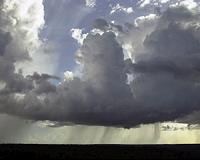| . |  |
. |
Washington (AFP) Feb 3, 2011 A pair of unusually severe droughts have parched the Amazon in recent years, raising concern about the rainforest's future as a major absorber of carbon emissions, said a study on Thursday. A rare drought in 2005 was billed as a once-in-a-hundred-years event, but then it was followed by another drought in 2010 that may have been even worse, said the team of British and Brazilian experts in the journal Science. Since the droughts killed many trees, the scientists predict that the Amazon will not be able to absorb as much carbon dioxide from the atmosphere as usual in the years to come, removing an important global buffer against pollution. Even worse, rotting trees may release into the atmosphere as much as five billion tons of C02 in the coming years, almost as much as the entire United States emitted from fossil fuel use in 2009, with 5.4 billion tonnes. "Having two events of this magnitude in such close succession is extremely unusual, but is unfortunately consistent with those climate models that project a grim future for Amazonia," said lead author Simon Lewis of the University of Leeds. Based on the impact of the dry spell on tree deaths in 2005, the team projected that "Amazon forests will not absorb their usual 1.5 billion tonnes of CO2 from the atmosphere in both 2010 and 2011," the study said. In addition, "a further five billion tonnes of CO2 will be released to the atmosphere over the coming years once the trees that are killed by the new drought rot." However, co-author Paulo Brando, a Brazilian scientist, said more research needs to be done to determine how many trees died, and what their impact will be. "Our results should be seen as an initial estimate. The emissions estimates do not include those from forest fires, which spread over extensive areas of the Amazon during hot and dry years. These fires release large amounts of carbon to the atmosphere," he said. "It could be that many of the drought-susceptible trees were killed off in 2005, which would reduce the number killed last year," said Brando, who hails from Brazil's Amazon Environmental Research Institute (IPAM). "On the other hand, the first drought may have weakened a large number of trees so increasing the number dying in the 2010 dry season." Lewis said the main concern is that such events could be creating a vicious cycle. "If greenhouse gas emissions contribute to Amazon droughts that in turn cause forests to release carbon, this feedback loop would be extremely concerning," he said. "Two unusual and extreme droughts occurring within a decade may largely offset the carbon absorbed by intact Amazon forests during that time," he added. "If events like this happen more often, the Amazon rainforest would reach a point where it shifts from being a valuable carbon sink slowing climate change, to a major source of greenhouse gases that could speed it up."
Share This Article With Planet Earth
Related Links Water News - Science, Technology and Politics
 Rain In Spain Is On The Decline
Rain In Spain Is On The DeclineMadrid, Spain (SPX) Feb 03, 2011 A study led by the University of Zaragoza (UNIZAR) has studied precipitation trends in Spain's 10 hydrological basins over the 1946 to 2005 period. The results show that precipitation has declined overall between the months of March and June, reducing the length of the rainy season. The rains are heavier in October in the north west of the country. Since 1946, the average precipitation fal ... read more |
|
| The content herein, unless otherwise known to be public domain, are Copyright 1995-2010 - SpaceDaily. AFP and UPI Wire Stories are copyright Agence France-Presse and United Press International. ESA Portal Reports are copyright European Space Agency. All NASA sourced material is public domain. Additional copyrights may apply in whole or part to other bona fide parties. Advertising does not imply endorsement,agreement or approval of any opinions, statements or information provided by SpaceDaily on any Web page published or hosted by SpaceDaily. Privacy Statement |